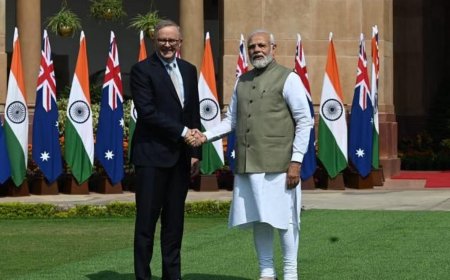Australia's Declining Appeal for International Students: What's Going Wrong?
Australia faces challenges with new international student caps, risking its reputation as a top study destination. Experts warn of competition from the UK and US.
Australia, known for its world-class educational institutions and high-quality tertiary education, is seeing its reputation waver. The country's proposed cap on international student numbers, set to take effect in 2025, has sparked concern within the academic community, with experts warning of potential long-term damage to Australia's standing as a top study destination. This new policy limits foreign student places to 270,000, divided between higher education (175,000) and vocational training institutions (95,000).
The Concerns Raised by University Leaders
Universities Australia Chair David Lloyd has been one of the most vocal critics of the government’s decision, warning that the restrictions could cause Australia to lose its competitive edge to other major study destinations. He pointed to Canada’s experience, where similar caps led to a significant drop in international enrolments. “Australia could face the same fate as Canada if prospective students feel unwelcome and decide their future isn’t worth gambling with,” Lloyd stated during a speech at the National Press Club.
Lloyd emphasized that competitors such as the UK and US are ready to step in and attract international students who may now see Australia as a less favorable option. He underscored the fact that international education plays a vital role in Australia’s economy and global relations. With this policy, the country risks losing both economic benefits and the global friendships cultivated through international student exchanges.
Support for the Caps Amid Public Concerns
Despite the warnings from universities, public opinion appears to favor the caps. A recent poll by Essential revealed that more than 50% of Australians believe the cap of 270,000 students is "about right," while 37% think it is still too high. This support stems from concerns about the country's growing migration and housing issues, particularly in the post-pandemic period.
These caps come at a time when Australia is grappling with a housing crisis, and many voters are anxious about the broader impacts of migration. With an election looming in the next nine months, the Labor government’s decision may reflect its effort to align with voter sentiments.
A Divergence in Political and Educational Goals
Education Minister Jason Clare has defended the student cap policy, arguing that it is designed to protect the integrity of Australia’s international education system. “This system makes us money and makes us friends, but we need to make sure it’s used in a way that preserves its integrity,” he said. Clare was adamant that universities should not dictate migration policy, emphasizing that the government’s responsibility is to manage the system "in a better and fair way."
However, many within the education sector, including Lloyd, argue that the policy undermines Australia’s ability to compete in the global education market. They fear that if international students feel unwelcome, they will choose to study in countries where policies are more student-friendly. This could have profound effects on Australia’s education system, particularly for universities heavily reliant on international enrolments for revenue and research funding.
States React: A Balancing Act Between Education and Migration
In response to these concerns, Victorian Premier Jacinta Allen, who leads Australia's second-largest state, is working to counter the negative impacts by promoting stronger ties with key countries like India. In a recent interview, Allen emphasized that Victoria remains committed to welcoming international students, and she will be working to enhance educational exchanges with India during her upcoming visit.
However, the broader national policy continues to raise questions. While states like Victoria may seek to soften the blow through diplomatic efforts, the overall reduction in international student numbers could have far-reaching consequences for the entire country. Australia’s universities are renowned globally, and this reputation has been built on a steady flow of international students who contribute to the academic, cultural, and economic vibrancy of the nation.
The Global Education Landscape: What’s Next for Australia?
As other major players in the international education sector, such as the UK and US, continue to welcome students, Australia risks falling behind if its policies are perceived as restrictive. David Lloyd’s warning is a stark reminder that international students are vital to the nation’s future, not just for financial reasons but also for fostering global goodwill.
If Australia does not carefully navigate this issue, it could see a dramatic shift in its place within the global education landscape. With other nations standing by to capitalize on Australia’s policy changes, the country’s education sector must adapt to avoid the fate seen in Canada and other nations that have struggled with student caps.
Conclusion: A Critical Time for Australia’s Education System
The debate over international student caps highlights a fundamental tension between managing migration and maintaining a thriving education sector. As the government seeks to balance voter concerns with the needs of the higher education industry, the future of Australia as a top destination for international students hangs in the balance. The next few years will be critical in determining whether Australia can continue to attract students from around the world or whether it will cede ground to its competitors.
What's Your Reaction?
 Like
0
Like
0
 Dislike
0
Dislike
0
 Love
0
Love
0
 Funny
0
Funny
0
 Angry
0
Angry
0
 Sad
0
Sad
0
 Wow
0
Wow
0









































































































